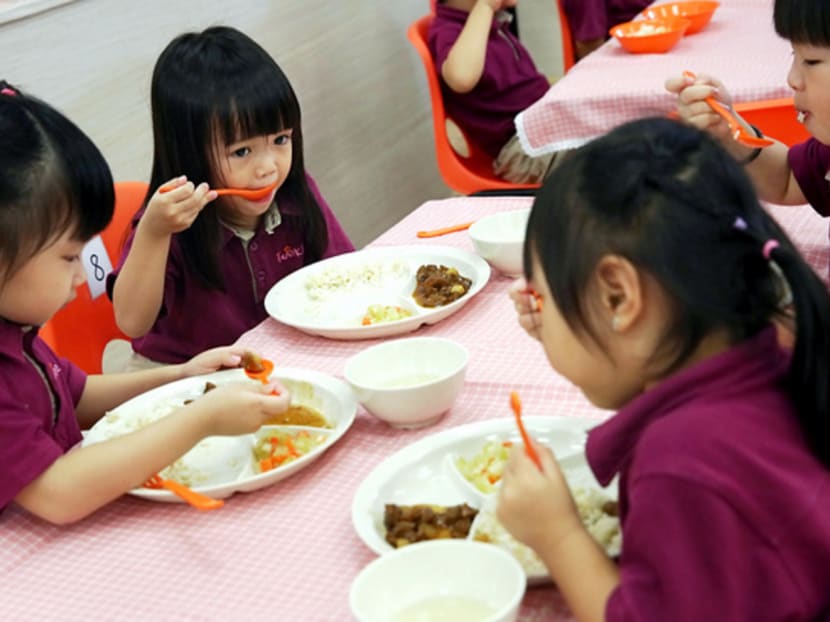Pre-schoolers to get more physical activity, healthier food
SINGAPORE — Pre-schoolers will get at least one hour daily of physical activity in school soon — up from the current 30 minutes — as part of recommendations to encourage a healthy and active lifestyle from young by the NurtureSG Taskforce.
SINGAPORE — Pre-schoolers will get at least one hour daily of physical activity in school soon — up from the current 30 minutes — as part of recommendations to encourage a healthy and active lifestyle from young by the NurtureSG Taskforce.
Pre-schools will also need to meet requirements on serving a variety of food groups in meals, and cut out sugary drinks and deep-fried food.
These recommendations, which have been accepted by the Education and Health ministries, were drawn up after nearly a year of work by the NurtureSG Taskforce, and cover the pre-school to tertiary levels.
Spanning physical activity and nutrition, mental well-being and sleep health, the recommendations will be rolled out within this year.
Speaking at the launch of the recommendations yesterday, Minister of State for Health Lam Pin Min, who co-leads the task force with Minister of State for Education Janil Puthucheary, said the health and well-being of the young are “constantly under threat” from various factors, one of them being today’s “affluent lifestyle”.
“Physically, our young children are consuming more unhealthy food and high-caloric diets,” he said. “At the same time, we also recognise that our children are using more social media. Very often we can see young children on our handheld devices, looking at email, YouTube, or even gaming, and that has also resulted in children not exercising enough and leading a more sedentary lifestyle.”
Among polytechnic and junior-college students, the level of physical activity has decreased, while there is also increasing concern over students’ mental health, from threats such as cyber bullying and suicide rates.
In response to queries, MOH said, based on past surveys, one in 10 mainstream school or Institute of Technical Education (ITE) students, and two in 10 polytechnic students had sufficient physical activity.
The proportion of 15-year-old Singaporeans who have at least 60 minutes of physical activity daily is 9.6 per cent, compared with 25 per cent in the United States.
At the pre-school level, the Early Childhood Development Agency (ECDA) will require the minimum daily time for physical activities for full-day programmes be increased to an hour daily, of which half an hour is to be conducted outdoors. This is to cultivate young children’s interests in physical activities, and to prevent the early onset of myopia, the authorities said.
The ECDA will also specify the need for a variety of food groups to be included in meals and the regular provision of fruits, as well as ban sugary drinks, deep-fried food and preserved food from the menu. The MOH said that, as of January, about 71 per cent of childcare centres in Singapore are providing healthier food and drinks to more than 64,000 children.
For older students, beyond physical education lessons, there will be more opportunities for “unstructured play” beyond the formal curriculum time, such as during recess or after school hours. Schools will also make available facilities and sports equipment for loan to students during those times.
All 359 mainstream schools — primary and secondary schools, junior colleges and centralised institutes — will also provide healthier food and drink options for students in canteens within this year.
At the tertiary level, the Health Promotion Board (HPB) wants to engage students as in-house instructors to conduct activities such as aerobics mass workouts and adventure-based classes for their fellow students. It will also push for all institutes of higher learning (IHLs) — which includes universities and polytechnics — to have canteens serving healthier meals by FY2019.
In the area of mental well-being, the MOE and HPB will establish peer support structures in mainstream schools and IHLs to enable students to look out for signs of mental stress among their peers.
The Tote Board has also set aside up to S$10 million to fund ground-up ideas on achieving better mental well-being and resilience in the young, and an Inter-Agency Research Workgroup for Youth Suicides has been set up to study issues surrounding suicides.
In the area of sleep health, the HPB will step up on public education, and the MOE will educate students about the importance of sleep health and good practices.
The MOH said, according to the Student Health Survey 2012-2013, 50 per cent of students from secondary schools, junior college and ITEs had about seven hours of sleep per day, and about a third had less than five-and-a-half hours of sleep. The recommended number of hours of sleep for youths aged 14 to 17 is eight to 10 hours. ADDITIONAL REPORTING BY JEONG HONGBIN







